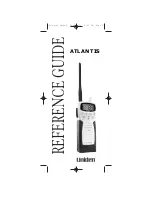
8
Circuit Description
Demodulated audio is output from pin 9 of the Narrow IF
IC through narrow mute analog switch
Q2020
(
2SJ364
)
and squelch gate
Q2026
(
2SJ364
) before de-emphasis at
Q2019
(
DTC144EE
).
The resulting audio is amplified by AF amplifier
Q2028
(
TDA7233D
) and output through MIC/EAR jack J2001 to
internal speaker SP1001 or an external earphone.
First Intermediate Frequency (Wide FM)
The 45.8 MHz first intermediate frequency from first mix-
ers is delivered from the RF UNIT to the AF UNIT through
jacks J1003 and J2002. On the AF UNIT, the IF for Wide
FM signals is passed through NAR/WIDE switch
D2001
(
DAP222
) and IF amplifier
Q2004
(
2SC4915
) and second
mixer
Q2009
(
2SC4915
).
The 10.7 MHz intermediate frequency product of the mix-
er is delivered to the 10.7 MHz ceramic filter
CF2001
passed
through NAR/WIDE switch
D2002
(
DAN222
) for input to
pin 16 of IF IC
Q2013
after amplitude.
Meanwhile, a portion of the output of 11.7 MHz crystal
X1001
on RF UNIT is multiplied fourfold by
Q2007
(
2SC4915
) to provide the 35.1 MHz second local signal,
applied to the second mixer
Q2009
. Within the second
mixer, this signal is mixed with the 45.8 MHz first inter-
mediate frequency signal to produce the 10.7 MHz second
intermediate frequency.
Also, a portion of the output of 11.7 MHz crystal
X1001
on
RF UNIT is amplitude by
Q2005
and
Q2010
to provide the
11.7 MHz third local signal, applied to the IF IC
Q2013
.
Within the IC, this signal is mixed with the 10.7 MHz sec-
ond intermediate frequency signal to produce the 450 KHz
second intermediate frequency.
Demodulated audio is output from pin 9 of the Narrow IF
IC through narrow mute analog switch
Q2020
and squelch
gate
Q2026
before de-emphasis at
Q2019
.
The resulting audio is amplified by AF amplifier
Q2028
and output through MIC/EAR jack J2001 to internal speaker
SP1001 or an external earphone.
Squelch Control
Signal components in the neighborhood of 15 KHz con-
tained in the discriminator output pass through an active
band-pass filter composed of R2059, R2060, R2062, C2076,
C2078 and the operational amplifier between pins 7 and 8
within IF IC
Q2013
. They are then rectified by D2006 and
D2007
(
MC2850
) to obtain a DC voltage corresponding to
the level of noise. This voltage is input to pin 51 of CPU
Q3023
(
HD64F2238RTF13
), which compares the input
voltage with a previously set threshold. When the input
voltage drops below the threshold, normally due to the
presence of a carrier, turning on squelch gate
Q2026
and
allowing any demodulated audio to pass. At the same time,
Q3001
and/or
Q3003
and/or
Q3004
goes on, causing the
BUSY/TX lamp
D3010
(
FRGB1312CE-10-TF
) to light.
Transmitter Signal Flow
VHF Band Transmit/Receive Switching
Closing PTT switch S2002 on the AF UNIT pulls the base
of
Q3008
(
DTA144EE
) low, causing the collector to go high.
This signal is input to pin 41 (PTT) of CPU
Q3023
, allow-
ing the CPU to recognize that the PTT switch has been
pushed. When the CPU detects closure of the PTT switch,
pin 17 (TX/RX) goes high. This control signal is delivered
to the RF UNIT, where it switches
Q1029
(
UMW1
) and
Q1028
(
CPH6102
) to produce the TX control signal that
activates
Q1035
(
2SA1774
). At the same time, PLL divi-
sion data is input to PLL IC
Q1013
(
MB15A01PFV1
) from
the CPU, to disable the receiver power saver. Also, switch-
ing
Q1033
(
KRC654U
) to disable the receiver circuits. Then
causing the red side of BUSY/TX lamp
D3033
to light.
Modulation
Voice signal input from either built-in microphone MC1001
(EM-140) on CNTL UNIT or external jack J2001 on the AF
UNIT is pre-emphasized by C3011 and R3025, and pro-
cessed by microphone amplifier
Q3006
(
NJM3403AV
), IDC
(instantaneous deviation control) circuit to prevent over-
modulation, and active low-pass filter.
During CTCSS operation, the voice signal is mixed with
the TONE ENC subaudible tone signal from pin 43 of the
CPU and delivered to the RF UNIT through jacks J3003
and J1003.
VHF Band Transmission
Modulating audio from the CNTL UNIT passes through
deviation setting D/A converter
Q3010
to VHF MOD of
the VCO UNIT mounted on the RF UNIT. This signal is
applied to varactor
D4005
(
HSC277
) in the tank circuit of
VHF VCO
Q4004
(
EC3H07B
), which oscillates at the de-
sired VHF transmitting frequency. The modulated VCO
signal is buffered by amplifier
Q4006
(
EC3H07B
) and
Q1011
and delivered through VHF T/R diode switch
D1022
to the RF UNIT. The modulated low-level VHF transmit
signal from the VCO is passed through diode switch
D1024
(
DAN222
) to amplifier
Q1008
(
2SC5226-5
). The modulat-
ed VHF transmit signal from the VCO is amplified by
Q1016
(
2SK3475
) and RF power amplifier
Q1019
(
2SK3476
) up to 5 W (Marine). The RF output passes
through TX diode switch
D1033
. RF output is passed by T/
R switch and low-pass filter to suppress harmonics and
spurious products before output to the antenna at the an-
tenna terminal.
Summary of Contents for HX471S
Page 1: ...1 SERVICE MANUAL Submersible Multi Band Marine Portable HX471S EM002N95B ...
Page 5: ...5 Block Diagram ...
Page 6: ...6 Connection Diagram ...
Page 10: ...10 Circuit Description Note ...
Page 16: ...16 Circuit Diagram RF Unit Lot 4 6 ...
Page 17: ...17 Circuit Diagram RF Unit Lot 7 ...
Page 18: ...18 Note RF Unit ...
Page 32: ...32 Circuit Diagram AF Unit Lot 3 6 ...
Page 33: ...33 Circuit Diagram AF Unit Lot 7 ...
Page 34: ...34 Note AF Unit ...
Page 46: ...46 Note AF Unit ...
Page 48: ...48 CNTL Unit Lot 3 Circuit Diagram ...
Page 58: ...58 Note CNTL Unit ...
Page 62: ...62 Note VCO Unit ...
Page 64: ...64 FVP 31 Option Circuit Diagram Parts Layout Side A SideB NJM2904V Q5002 CMX264 Q5001 ...









































